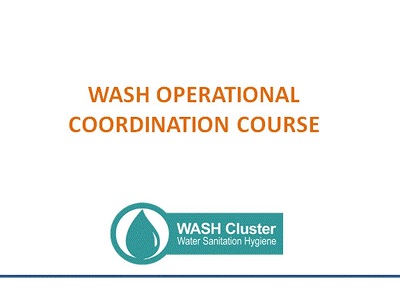GWC WASH COORDINATION TRAINING PATHWAY
This course is part of the GWC training pathway, created for both WASH Cluster partners and UNICEF staff involved in coordination to ensure the efficient WASH coordination in humanitarian action. This training pathway includes the following courses, most of them available in AGORA's catalogue:
- Partners' briefing on Humanitarian WASH coordination: Three succesive face to face briefing modules providing essential information on partner’s roles to actively participate in humanitarian WASH Coordination. For all WASH partners involved in humanitarian response
- Humanitarian WASH Coordination Induction: 2 days online training providing essential information and tools to coordinate WASH Cluster. For WASH partners or new UNICEF WASH staff fulfilling a WASH coordination role. Some sections are specific to IMO
- WASH Operational coordination (WOC): 5 days residential training providing operational tools and skills for WASH coordination. For Humanitarian WASH cluster / sector coordinators
- WASH Leadership & coordination (L&C). 5 days residential training to strengthen the skills for leading humanitarian WASH coordination platform. For Humanitarian WASH cluster / sector coordinators
- Government Led coordination of WASH in Emergency (GoLWIE, not yet on Agora). Several days workshop aiming at strengthening the role of national and regional government in leading and coordinating the humanitarian WASH response. Under pilot phase. Contact GWC if you are interested to pilot a GoLWIE in your country
- Market-based programming for WASH in Emergency (MBPWIE): 5 days residential training to strengthen the skills of WASH practitioners on Market and Cash related tools used for WASH programming
- GWC Information Management Training: 5 days residential training to provide Information Management Officers with advanced skills to support information management for WASH coordination platforms during emergencies
- Coordinated assessment process: Planned for 2020
- GWC training of trainers: ToT are specifically designed to train high level UNICEF staff and partners to deliver GWC training in autonomy
COURSE BACKGROUND
The purpose of clusters is to ensure a well-coordinated, strategic, adequate, coherent and effective response. To perform adequately their mandate, WASH Cluster Coordinators, Information management Officers and Assessment Specialists need to have both a theory and practical knowledge of the Core Coordination Functions and the standard tools developed at global level to support the implementation of the core functions.
The WASH Operational Coordination Course presented in this is document is part of the training packages that the GWC proposes to all Humanitarian WASH Coordination Platforms. It is a generic course preferably provided at regional level, through direct practitioners’ training or Training of Trainers.
Learning objectives
The course aims at providing current or future Humanitarian WASH Coordination Platform team members (both coordinators and information management officers) with operational tools and competencies to perform all tasks related to the 6+1 core coordination functions at national or subnational level in protracted and/or sudden emergency settings, building on an in-depth understanding of the relationship between Information Management and Cluster Coordination. It put emphasis on the list of Minimum Requirements for National Humanitarian WASH Coordination Platforms to be achieved in term of outputs and timing across the HPC. This training focuses on the role of IASC clusters that are formally activated in the context of emergencies. However, many of the same principles can be applied in support of Government-led emergency or crisis sectoral coordination mechanisms.
The specific learning objectives are:
- Improve participant’s knowledge of all components and functioning of the Humanitarian Coordination System
- Train participants to perform all tasks related to the 6+1 core coordination functions for each step of the Humanitarian Program Cycle, in both protracted or sudden onset emergency setting through practical exercises and simulations
- Explore the practical relationship between coordination and information management through each of the core functions of clusters/sectors in order to improve coordination system efficiency and outputs.
- Improve participants’ basic soft skills required for effective coordination
Audience
- Current or future WASH cluster coordinators and IMO (assessment specialists being a secondary target)
- Governmental officers from ministries involved in the humanitarian WASH coordination
- WASH partners staff supporting the coordination at national or sub-national level
- UNICEF staff involved in managing WASH programmes
Lenght
The course will be 5 days, from 8:30am to 5:30pm, divided as follows:- 1 presentation about general concepts and practicalities of humanitarian coordination system and functions, HPC, coordinator and IM related tasks
- 4 days on protracted/slow emergency simulation, following the whole HPC cycle
- 1 days on sudden onset L3 emergency simulation, highlighting specificities of this type of response
